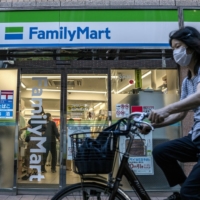The top three convenience store chain operators in Japan are moving forward with turnaround strategies to rebound from the damage inflicted by the spread of COVID-19.
With each seeking to win back customers, the three have adopted different strategies, raising expectations that they will move away from the industry norm of operating almost identical stores following efforts to streamline operations amid acute labor shortages, which they were experiencing even before the outbreak of the coronavirus pandemic.
Lawson Inc., which suffered an earnings fall in the business year that ended in February for the first time in seven years, is pushing ahead with a strategy based on a practice widely avoided in the industry.
Lawson will rapidly increase its machikado chūbo (town kitchen) stores this year, President Sadanobu Takemasu has said.
Machikado chubo is a service offering boxed meals using freshly cooked rice and other ingredients prepared in the store. Given the heavy workload for staff members, convenience store owners tend to avoid the service. Of Lawson’s roughly 14,000 domestic stores, only 6,500 or so have adopted the service.
But after the coronavirus pandemic contributed to an increase of about 10% in sales at machikado chubo stores, Takemasu decided to increase their number to around 10,000 by the year through February 2023.
Lawson will also tie up with well-known restaurant operators to offer more attractive food items.
FamilyMart Co., which plunged into a group net loss, is outpacing Lawson and Seven-Eleven Japan Co. in terms of introducing labor-saving operations. In March, it opened a store with an unmanned payment system in an office building in Tokyo’s Marunouchi business district. The store is staffed by a single worker, who replenishes goods on the shelves.
The system “not only provides an effective solution to the shortage of labor but also helps cut personnel costs,” FamilyMart President Kensuke Hosomi has said.
The system also reduces floor space to one-third of a conventional convenience store, making it possible to open outlets in “micromarkets,” such as inside small hospitals and offices.
In addition, FamilyMart is making use of digital technology to win customers, distributing coupons that can be used as payment when customers use its FamiPay mobile app for shopping.
Industry leader Seven-Eleven Japan, meanwhile, incurred its first sales drop in 11 years, but the impact of the pandemic was smaller than at Lawson and FamilyMart. Promoting its own home delivery service as the core of its turnaround strategy, Seven-Eleven plans to boost its “online convenience stores” in a bid to expand its lead over its rivals.
Utilizing a nationwide chain of some 21,000 stores, Seven-Eleven Japan has established a system of delivering products ordered online to customers from physical outlets in as little as half an hour. In doing so, the company has added fast delivery to the appeal of the products it has developed in cooperation with manufacturers.
Seven-Eleven Japan plans to increase its number of physical stores offering home deliveries to around 1,000, mainly in the Tokyo metropolitan area, by the end of the current business year.
“We will brush up our home delivery service to encourage customers to repeat purchases from us,” Seven-Eleven Japan President Fumihiko Matsunaga has said.
Seven-Eleven Japan has opened its home delivery service network for use by Sogo & Seibu department stores and the Denny’s restaurant chain, which also belong to Seven & I Holdings Co., to generate groupwide synergy effects as it bounces back from the impact of the coronavirus crisis.
In a time of both misinformation and too much information, quality journalism is more crucial than ever.
By subscribing, you can help us get the story right.
SUBSCRIBE NOW



